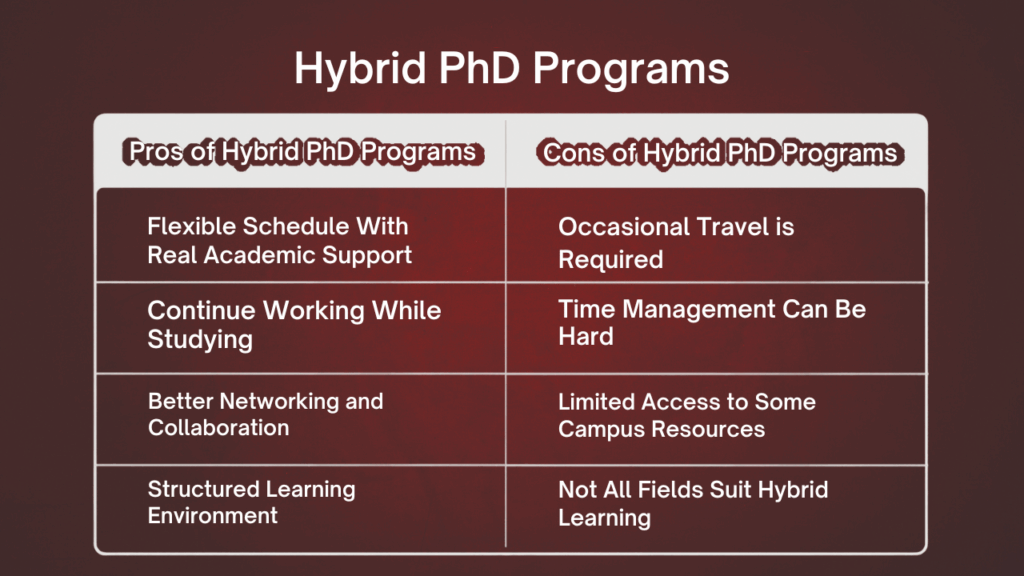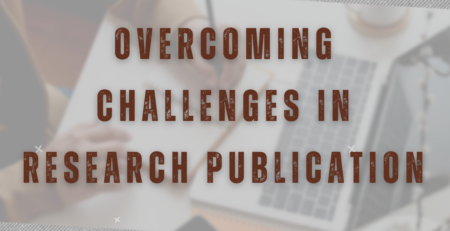Hybrid PhD Programs: Pros, Cons, and How to Make Them Work for You?
Kenfra Research - Bavithra2025-11-14T17:21:03+05:30Hybrid PhD programs are becoming a popular choice for students who want the depth of a doctoral degree but need the flexibility of online learning. Instead of attending classes fully on campus, hybrid PhD programs combine online coursework with in-person sessions. This model helps working professionals, parents, and international students continue their education without giving up their jobs or relocating completely. In this article, we will explore the pros, cons, and practical tips to help you succeed in a hybrid PhD.
What Are Hybrid PhD Programs?
Hybrid PhD programs, also called blended learning PhD programs, mix online learning with face-to-face academic requirements. While course lectures, discussions, and assignments may happen online, research workshops, labs, or dissertation meetings may require campus visits.
They are different from fully online PhD programs, which rarely require physical attendance. Hybrid formats are ideal for fields like education, business, public health, psychology, and engineering, where some in-person interaction is helpful.
Why Students Choose Hybrid PhD Programs?
Many students choose hybrid PhD programs for the flexibility they offer. You can continue your job, stay with your family, and still earn a high-level research degree. Hybrid learning is also more structured than self-paced online programs, which helps students stay disciplined and connected to their university community.
Key motivations include saving time and travel costs, maintaining employment, accessing global faculty and peers, achieving a better work–life balance, and being able to apply research directly to the workplace.

Pros of Hybrid PhD Programs
1. Flexible Schedule With Real Academic Support
One of the biggest advantages of hybrid PhD programs is flexibility. You can attend online classes from anywhere, which helps if you have long work hours or family responsibilities. At the same time, in-person sessions give you direct access to professors, labs, and research resources.
This balance makes flexible doctoral programs easier to manage compared to fully on-campus degrees.
2. Continue Working While Studying
Many students cannot afford to leave their jobs for several years. Hybrid PhD programs allow you to work and study at the same time. This helps you gain financial stability and apply your research ideas directly to your job.
For professionals in education, business, health, or industry, this is extremely valuable.
3. Better Networking and Collaboration
Compared to online-only PhDs, hybrid programs offer more opportunities to meet faculty members and peers in person. These connections often lead to research collaborations, career opportunities, stronger recommendation letters, and a more supportive academic network. Networking is a significant advantage when pursuing a PhD, as research can feel isolating without peer support.
4. Structured Learning Environment
Hybrid PhD programs offer regular check-ins, scheduled workshops, and research guidance. This helps students stay motivated and avoid the common issue of “online learning fatigue.” Many students find it easier to finish their program when they have structured deadlines.
Cons of Hybrid PhD Programs
1. Occasional Travel Is Required
Even though most work is completed online, you may still need to visit campus for research presentations, lab work, dissertation meetings, or seminars and group projects. For international students, these visits can become costly, so it’s important to check the program’s travel expectations before applying.
2. Time Management Can Be Hard
Balancing job duties, family responsibilities, and doctoral work can be overwhelming. Without strong planning, even flexible doctoral programs can feel stressful. You must be disciplined and consistent.
3. Limited Access to Some Campus Resources
While hybrid PhD students have access to many online tools, certain facilities like specialized labs, equipment, or libraries may require in-person visits. If your research depends on these, planning becomes important.
4. Not All Fields Suit Hybrid Learning
Some subjects especially lab-based sciences may not function well in a hybrid format. Programs in humanities, social sciences, education, and business are more commonly available.
How to Make Hybrid PhD Programs Work for You?
Hybrid learning requires a smart approach. Here are proven strategies for success.
1. Create a Weekly Study Plan
Hybrid PhD programs give you flexibility, but that does not mean you should study randomly. Set fixed times each week for reading, writing, and research. Consistency makes a big difference.
2. Use Productivity Tools
Simple tools like Google Calendar, Notion, Zotero, Trello, and other research management apps can help you track deadlines and organize your PhD work effectively.
3. Stay Connected With Your Supervisor
Because most meetings are online, communication becomes even more important. Schedule regular check-ins with your guide to discuss progress, challenges, and next steps.
Clear communication reduces confusion during the dissertation phase.
4. Make the Most of Campus Visits
When you visit the campus, try to meet your supervisor in person, attend workshops, use the library, and network with other researchers. These visits help strengthen your academic foundation.
5. Build a Support System
Hybrid PhD programs can feel lonely if you don’t have support, so it’s important to connect with fellow students, online study groups, mentors, and family and friends. A strong support system helps keep you motivated during tough phases.
6. Choose the Right Topic Early
Since hybrid PhD students often work full-time, choosing a practical and manageable research topic is essential. Select a topic related to your job, industry, or prior experience. This makes research more meaningful and achievable.

FAQs About Hybrid PhD Programs
1. How many campus visits are needed?
Most programs require 2–6 visits a year. However, this varies by university and field.
2. Can I balance a job with a hybrid PhD?
Yes. In fact, hybrid programs are designed for working professionals. With proper time management, it is very doable.
3. Do hybrid PhDs take longer to finish?
Usually they take a similar duration as regular PhDs (3–6 years), depending on research progress and your schedule.
4. What fields offer hybrid PhD programs?
Common fields include business, education, psychology, public health, engineering, and social sciences.
Conclusion
Hybrid PhD programs offer the perfect blend of flexibility and academic support. They help you continue your professional life while earning a respected doctoral degree. If you plan your time well, stay organized, and communicate regularly with your guide, a hybrid PhD can be a rewarding and manageable experience.
If you need structured assistance, expert guidance, or support throughout your PhD journey, Kenfra Research is here to help.








Leave a Reply